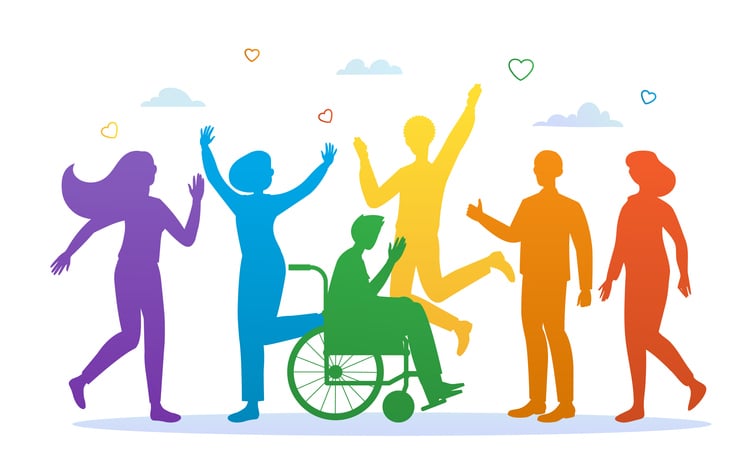Pride Month in June is a vibrant and essential time for celebration, advocacy, and raising awareness for the LGBTQ+ community. We see rainbow flags adorning hospitals, clinics, and communities, and it's a wonderful display of solidarity. But as Nurses, our commitment to providing safe, respectful, and affirming care for our LGBTQ+ patients must extend far beyond a single month.
True LGBTQ+ inclusive Nursing care isn't a seasonal effort; it's a continuous practice woven into the fabric of our daily routines. It's about ensuring every patient who walks through our doors feels seen, heard, and valued, not just during Pride, but every single day of the year.
So, how do we move "beyond the rainbow flag" and cultivate truly year-round LGBTQ+ affirming Nursing practice? Let's explore some key areas:
Best Practices: The Foundation of Affirming Care
The seemingly small details can make the biggest difference in creating an affirming environment.
- Inclusive Language and Preferred Pronouns: This is paramount. Always ask patients for their preferred name and pronouns, and use them consistently. A simple "What name do you prefer to go by?" and "What pronouns do you use?" can open the door to respectful communication. If you make a mistake, apologize, correct yourself, and move on.
- Updating Patient Intake Forms: Are your intake forms still limited to "male" or "female" and "single" or "married"? They shouldn't be. Advocate for and utilize forms that accurately capture gender identity (e.g., cisgender, transgender, non-binary) and sexual orientation. This allows us to gather crucial information for holistic care.
- Respecting Chosen Names: For many transgender and non-binary individuals, their chosen name is deeply significant to their identity. Always use a patient's chosen name, even if it differs from their legal name, and ensure it's communicated across the care team.
- Avoiding Assumptions: Never assume a patient's gender identity, sexual orientation, relationship status, or lifestyle. This means refraining from comments like, "Does your husband know you're here?" Instead, use gender-neutral language like "partner" or "significant other" until you have more information.
Addressing Microaggressions: Recognizing and Responding
Microaggressions are subtle, often unintentional, expressions of bias that can invalidate or demean LGBTQ+ individuals. They can chip away at a patient's sense of safety and trust.
- Educate Yourself: Learn to recognize common LGBTQ+ microaggressions, such as misgendering, assuming all LGBTQ+ people are promiscuous, or dismissing a patient's health concerns as "lifestyle choices."
- Speak Up (Respectfully): If you witness a microaggression from a colleague, family member, or even another patient, address it. This doesn't mean being confrontational, but rather gently correcting misinformation or redirecting the conversation. For example, "Actually, [patient's preferred pronoun] is 'they/them'," or "It's important that we use inclusive language here."
- Support the Patient: If a patient experiences a microaggression, acknowledge their feelings and validate their experience. Let them know you are a safe person to talk to.
Creating Safe Spaces: Fostering Trust and Openness
A safe space is one where patients feel comfortable disclosing their identities and health concerns, knowing they will receive equitable and non-judgmental care.
- Visible Affirmation: Displaying pride symbols, inclusive signage, or ally stickers can signal to LGBTQ+ patients they are in a welcoming environment.
- Confidentiality and Privacy: Reassure patients that their identities and health information will be kept confidential, especially when discussing sensitive topics related to sexual orientation or gender identity.
- Non-Judgmental Approach: Approach every patient with an open mind and heart. Your role is to provide care, not to judge. Be aware of your own biases and work to mitigate them. Take our quiz to see how familiar you are with unconscious bias.
- Patient-Centered Communication: Encourage patients to share their experiences and concerns. Actively listen and demonstrate empathy.
Education and Resources: Continuous Learning
The landscape of LGBTQ+ health is constantly evolving, and as Nurses, we have a professional responsibility to stay informed.
- The National LGBTQIA+ Health Education Center: This invaluable resource provides a wealth of information, training, and clinical guidelines specifically tailored for healthcare professionals.
- GLMA (Health Professionals Advancing LGBTQ Equality): GLMA offers educational programs, advocacy initiatives, and a network of LGBTQ+ affirming healthcare providers.
- Professional Organizations: Many Nursing organizations now offer resources and position statements on LGBTQ+ health.
- Community Resources: Familiarize yourself with local LGBTQ+ community centers, support groups, and healthcare providers who specialize in LGBTQ+ affirming care. This can be incredibly helpful for patient referrals.
Cultivating year-round LGBTQ+ affirming care is an ongoing journey, not a destination. It requires continuous learning, self-reflection, and a deep commitment to treating every patient with the dignity and respect they deserve. By integrating these best practices into our daily routines, we can move beyond the rainbow flag and truly create healthcare environments where all individuals feel safe, respected, and understood, 365 days a year.


 Nurses must always be prepared to care for patients from all backgrounds, including the LGBTQ+ community. Caring for the LGBTQ+ community requires an educated, compassionate, and inclusive approach. As Nurses, we ensure every patient receives the most personalized and competent care possible. Here are some tips to help you provide better care to the LGBTQ+ community.
Nurses must always be prepared to care for patients from all backgrounds, including the LGBTQ+ community. Caring for the LGBTQ+ community requires an educated, compassionate, and inclusive approach. As Nurses, we ensure every patient receives the most personalized and competent care possible. Here are some tips to help you provide better care to the LGBTQ+ community. Health disparities are the health differences experienced between different groups based on race, ethnicity, disability, sex/gender, socioeconomic status, educational level, and more. Unfortunately, the LGBTQ+ community is no exception to health disparities.
Health disparities are the health differences experienced between different groups based on race, ethnicity, disability, sex/gender, socioeconomic status, educational level, and more. Unfortunately, the LGBTQ+ community is no exception to health disparities.